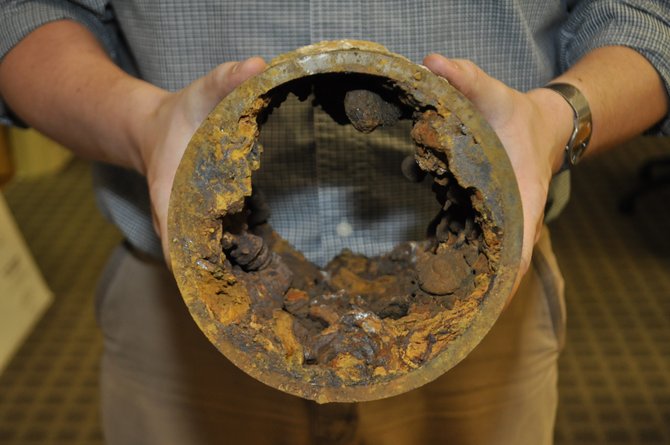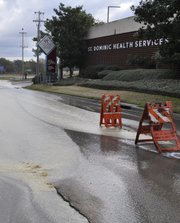This corroded pipe, which was dug up from under West Street, is made of cast iron, and doesn’t have a protective lining like newer ductile iron pipes do. Photo by Trip Burns.
If Jackson Mayor Chokwe Lumumba is looking for a pitch to sell Jacksonians on the proposed 1-percent sales tax, he could simply forward everyone the press releases regarding boil water notices from the city's Department of Public Works.
The department has issued six precautionary boil-water notices since Dec. 1. That may seem like a high number, but it's par for the course in Jackson, which averages 1,500 leaks per year—roughly nine times the national average.
Much happens before a precautionary notice is issued, but as interim Director of Public Works Willie Bell explained, they are fairly common when dealing with a burst pipe.
"We can have as many as three to four a day," Bell told the JFP last week. "It just depends on a couple of things, and the freezing weather has a lot to do with it.
"Imagine if you put a glass in the microwave, and warmed it until it got to the point where it was too hot to touch. Then you put ice-cold water into it, and it's shatters. That's what is going on, but in reverse with our frozen pipes underground."
When a break occurs, he said, they usually identify that there is a leak and contact the city through the 311 system or by calling City Hall. Once the call is logged, the city dispatches a crew to investigate. After the source of the leak is found, the crew has to decide how to deal with the problem.
"Sometimes, we can fix it without shutting off the water," Bell said. "We call it 'fixing it hot.' If we have that option, that's what we are going to try to do."
When Public Works cuts the water off, the Mississippi Department of Environmental Quality requires the city to issue a precautionary boil notice.
The other way the notice gets issued is if the water pressure drops below 20 PSI (pounds per square inch). When that happens, the flow is not strong enough to keep any potential contaminants from seeping into the pipe through the hole that produced the leak.
In either instance, the city must fix the leak, then test the acidity and purity of the water at the nearest hydrant for 48 hours. Sometimes, that means letting the hydrant gush for a day or more.
The leaks did not start overnight. Maps show that much of the city's piping, especially in the downtown area, were installed prior to 1910.
Findings from the Water Distribution System Rehabilitation master plan show that despite the city spending more than $125 million on water improvements since 1997, the city still has 97 miles of two and four-inch piping that has inordinate repairs and restricted fire flow and pressure.
That same report, assessed by Jackson-based firm Neel-Schaffer and several smaller engineering companies, suggests the city remove more than 112 miles of old, unlined cast iron piping and replace it with new lined ductile iron pipe, a process that would cost more than $300 million and could take 20 years to complete.
Other measures the city should take, it suggested, would be to complete the remaining transmission piping (another $25 million) and replace 97 miles of small-diameter pipes with larger-diameter pipes ($40 million). Much of the piping under the city is unlined, cast-iron pipe, which corrodes at a higher rate than ductile iron pipes, which cities started installing in the 1970s and 1980s.
Lumumba's point-man on the one-percent sales tax initiative, Walter Zinn, readily admits that voting for the referendum won't single-handedly fix the problem. What it will do, he said, is help the city leverage the resources it does have to begin to address the problem.
"If we pass the referendum, we would have an additional source of income that would allow us to float bonds with confidence that the money was going to be there for at least 18 years," Zinn said. "We could also go to these other entities, like the Mississippi Department of Transportation, when we ask for their help, and show them that we are serious about preventing these types of problems in the future."




Comments